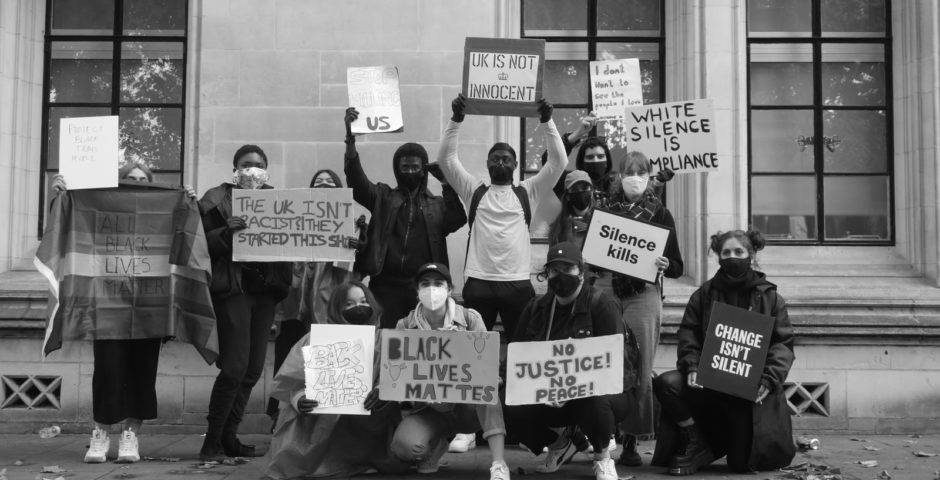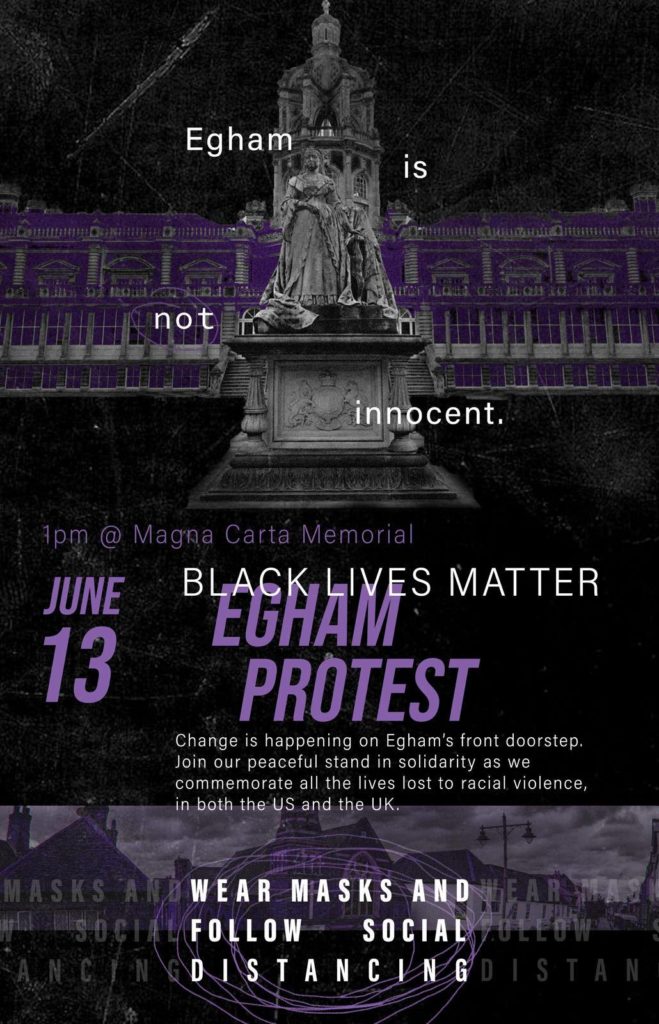
Egham needs to say Black Lives Matter: This is what it’s like being black at Royal Holloway
No place is exempt from change and reform – not even little old Egham.
I started my first year at Royal Holloway in September 2017 and my three years here have been overwhelmingly positive; I’ve made friendships I know will last me a lifetime, memories I can always treasure and have had experiences I never thought would come my way. But amidst all this positivity there are still pressing problems that I, and many other black students at Royal Holloway, have faced (and are still facing) during our time here. I leave university the way I started; feeling tokenized and wildly underrepresented.
First interactions
I never knew that a university so close to London – one of the UK’s most culturally and ethnically diverse cities – could be home to such ignorant and racist attitudes. This racism is perpetuated in so many different tones – there’s the nonchalant, casual comments that many white people perceive as innocent, and there’s the flatout N-word toting individuals who are far more blatant in their prejudice, and who the casual commenters think are the sole face of racism.
One of my first ever interactions in Egham High Street is with a very posh, tall white man. He stops me by Tesco and asks if – by chance – I’m selling weed, or know of anyone else who might be. I tell him no, then watch him return to his group of friends, scour the rest of the high street to spot a black girl near Specsavers, approach her and ask the same question.
Later the next day, I’m in a conversation with a couple of my new housemates and we’re talking about Doctor Who, and specifically Bill Potts, the 12th Doctor’s new companion. Bill is both a black woman and a lesbian, and one of the white participants in the conversation comments on this, asking a question that relates to ‘the BBC trying to push this agenda on us’.

‘What agenda?’ I ask him. Apparently being black and a lesbian are very overhwelming things to comprehend simultaneously.
‘Well, you know. She’s black and she’s gay, it’s like really different for Doctor Who, right?’
You mean in a show about aliens, parallel dimensions and immortal beings? The hardest part to comprehend is Bill Potts?
Then I ask what agenda they’re pushing when they cast – and predominantly cast – straight white men in the role of the doctor, or if he even perceives this as an agenda because it’s the ‘norm’. He doesn’t respond and someone else changes the topic.
Interestingly enough, that’s the last ever interaction I have with him (I won’t name and shame but if you’re reading this I hope you’re doing well and not still feeling overwhelmed.)
The next week at a houseparty another white man asks me if describing someone as black is offensive. I want to roll my eyes so deeply at the question that my sight may give out, but instead I calmly smile and explain that of course it isn’t, it’s purely a descriptive term, however if you were to affix it to an insult – i.e. black bitch (I still remember Cheryl) – then yes it would be because you’re implying said person’s blackness amplifies the insult and in the process becomes an insult itself. I also want to add that you even thinking blackness could be deemed offensive is slightly offensive itself, but by that point I’m tired of the conversation and a song I like is on so I go to dance.
Throughout my three years at university, I have constantly felt myself shift into this familiar role of the black educator, there to clarify and guide lost white souls who cannot bother to find educational sources concerning race themselves. I understand that a lot of people when first starting uni have never met a black person before, so naturally have many questions. But you also need to understand there is an appropriate time and place, especially if we’re only both strangers to one another.
Microaggression, tokenization and problematic discourse
I remember all these memories so vividly because they collectively contribute to the feeling and very real reality of constant microaggression, tokenization and problematic discourses a lot of white students at Royal Holloway engage in with their black counterparts. Sometimes the role of the black person in these conversations can be:
- The enraged, offended soul who storms off, and if said white person doesn’t understand why it’s upset you then they will only leave the conversation thinking you’re overly emotional and wildly irrational
- The enraged, offended soul who argues with the white person, and if your tone is far more heated or pointed than the white participant’s, they will only leave the conversation thinking you’re another angry black stereotype
- The swift subject-changer
- The stare-at-the-other-black-person-in-the-group and hope they can answer without your input, because you’re too emotionally exhausted to have another conversation about race that takes a greater toll on you than it does the white participants
I have on numerous occasions inhabited all of these roles. With regards to the 1st and 4th point, I do want to make something clear – there are black people who will be more prone to emotional rhetoric, to getting mad, who hate discussing race with white people and who these conversations take a much deeper toll on purely because it affects us more. Every debate and need to prove and persuade others of your reality chips away at you a little bit; every debate in class or home or at house parties or on Overheard. We don’t enter these dialogues from the same places.
Do not assume that our stance has been weakened in any sense. If you really want to know something that a black person cannot or does not want to teach you then you have the responsibility to find out that information from another source and keep searching until you find an answer, and not just think the whole argument is over. Not every single black person can be your educator.
Student experiences
Of course, though this article is concerned with my subjective experience at RHUL, I’m not alone in this reality. Recent creative writing graduate Meron Berhanu touches briefly on the tokenisation many black students often experience at university, and the overwhelming feeling of otherness:
“I walk into uni and I’m suddenly a minority. My new friends tell me they are excited to have a black friend for the first time. I admire their enthusiasm, but I feel like I’m an exhibit at a museum.”
American student Sajadeah Harris comments,
“The grouping of black problems with BAME problems and the Asian and Minority Ethnic part of that acronym is racist against black people as a failure to acknowledge separate struggles different ethnicity groups encounter, and downplays our issues.”
Then there are the more overt, easily-recognisable struggles black students experience, particularly revolving around the N-word. One graduate, who wishes to remain anonymous, says,
“There is no first and last time I had to hear the N-word from non-blacks at Royal Holloway, from white people trying to have a good time at parties listening to music, or my Arab acquaintances trying to blow off steam and express anger. The N-word is passed around like a bad joke or with unironic passion. But of course if you confronted these people they would say ‘none of us are racist, we’re already your friend’. Sometimes it feels like because Royal Holloway is so small, one would think black students can’t afford to make friends with anyone else.”
Yet another account, also from an anonymous source:
“My white ex-boyfriend said the n-word to my face. I had a housemate in first year who couldn’t date or sleep with anyone who wasn’t white.”
The tip of the iceberg
These are only the tip of the iceberg when it comes to racial issues on this campus. When we look at microaggressions we have to understand what they hint at or represent; a careless ignorance, and also the lack of effort or desire to want to address this ignorance, and what this could potentially develop into. All these educated students who make these countless comments, harbour these attitudes and continue to be perpetrators – however covert or apparent they may be – grow up to become teachers and lawyers and doctors and politicians and this ignorance only persists and festers in their workplaces. Sometimes their ignorance grows to become far more insidious racist acts.
Then there are the people who wonder what all of this has to do with ‘what’s happening in America’, and why we’re all suddenly angry now. A part of me wants to peacefully guide them to connect the dots, to see how the jigsaw pieces all fit together – that the small covert racial microaggressions countless black people face here and all over the world, and the more overt over-policing and unfair persecutions and murders of African-Americans by the US police are all products of the same systemically racist institution. Racism is so deeply ingrained in a system that has existed for so long that of course we’re all complicit in it, how could we not be? No race is exempt from racism, but you have to understand why it’s white people who are currently being highlighted the most in this conversation. The system most benefits you, and the only way to counter this privilege is to actively be anti-racist. You can no longer engage in silence or a failure to address such an alarming issue. Worryingly, in all my three years of being at Royal Holloway, I’ve been met with an overwhelming amount of silence. Slowly, things are starting to change but we still have a long way to go.
I write all this from the perspective of one black student, as someone who has deeply enjoyed his time at this university and considers himself relatively privileged to a lot of other black individuals who are far worse-off than I am. Despite what some may think of me, I am not prone to self-victimisation; I do see the world for all its opportunity. Life excites me.
But there’s only so much you can do alone when the system is built against you.
Egham Black Lives Matter protest
There’s an Egham Black Lives Matter protest coming up, whose event link is here. When I march in this protest, I carry all these experiences with me, and I carry every single time I’ve been harassed by a police officer or followed around a shop or had hurtful and offensive comments made by fellow students and educators. I also carry a deep-rooted sadness for every single George Floyd, Breona Taylor, Mark Duggan and Sarah Reed whose subjectuation to this system resulted in their tragic death. I urge everyone who can also participate to bear everything this and countless other articles have touched on, and to march with us.

The University’s stance on BLM
The student union’s BLM statement:
“Racism is a systemic, institutional issue, one that organisations such as Royal Holloway Students’ Union and the University need to take seriously. Whilst these protests are centred in America, the Black Lives Matter movement is not solely an American one. The same systematic racism the movement seeks to fight against is prevalent in our society in the UK also.”
Principal Paul Layzell’s newsletter:
“If we are to tackle racism and discrimination, we must recognise the structural and cultural change that is necessary throughout our society, for acts of extreme violence begin when we tolerate any form of racial prejudice and discrimination.”








































